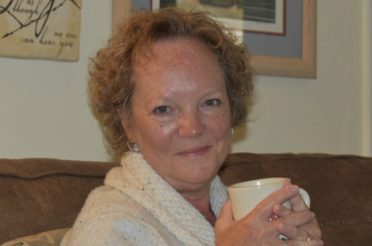By Roger Barbee
This morning as I prepared my stationary bike for my ride in the damp, dark morning, I noticed our front spot light was still on and made a mental note to turn it off after my ride. Mounting the bike, I hoped that I would remember.
Growing up in the 1950s of the South, all the mill houses, like ours at 312, had front porches that ran the width of the house. Chairs of various types would always be available for relaxing, and often porch swings hung by their chains from brackets in the porch ceiling, comfortably accommodated two adults or four playful children. Always painted white, the swings waited for a family member or members to “sit a spell” and rest or visit with a neighbor who happened by. After dark, they sometimes held young lovers who pushed gently back and forth whispering, snuggling, and maybe kissing—until a parent in the house turned the porch light on as a signal that it was time for the boy to leave and the girl to come into the house.
The porch light of 312, where I grew up, was a bare bulb screwed into a white, porcelain fixture. Usually white, the 25 or maybe 40-watt bulb, would be replaced by a yellow one during the hot months because mosquitoes and other unwanted bugs would not be as attracted to it as the white ones. Because the houses had no air conditioning the front porch became an extension of sorts for the family or living room where the cooler temperature of a hot summer day could be enjoyed. The dim, porch lights were turned on at dusk and turned off at dawn. Not as majestic as a lighthouse beacon, they served the same purpose- to guide sojourners by their 25-watt bulbs. Those bare bulbs led family and visitors through the dark and into the house.
I did, for once, remember to turn the front spot-light off following my ride. The back one, which illuminates the kitchen area, was turned off earlier. Our house, like all in our neighborhood and most neighborhoods today, has no front porch or, at best, has an outside vestibule large enough to stand while unlocking the front door. Modern homes are mostly built far from roads making contact with passers-by impossible, and the climate controlling system in each makes the desire for outside cooler air during hot, humid Southern nights obsolete. But modern homes have improved on the dim porch lights of post WWII America. Like ours, all or most, have spot-lights that come in several models, wattage, and other choices. Ours are operated by a switch in the house, but we could have ones that are motion detector controlled, dawn to dusk controlled, cell phone controlled, or with other systems. But the porch lights of today are installed for other reasons than the types I grew up with.
The modern porch light is designed to repel. It is a beacon, but one that shouts, “Go away, or the house alarms will signal the police to quickly come.” It does not invite the sojourner but is a Maginot line sold to make us feel safer.
There was a time in our lives that such home defenses were not needed, but those days slipped away. We now live in a culture of home invasion, purse snatching, and more. I do not fault homeowners for protecting their homes and family, but I question why our society has fallen to such a level that some are so brazen to invade a home or snatch the purse of an elderly woman in broad daylight. What bred in some people such bitterness that led to desperation then vile action?
Just as with the outside lights, I am like many people. But instead of lights, I am thinking about The Sermon on the Mount, which before this week I would have assured you that I had a solid understanding of, until I began reading Clarence Jordon’s explication. In Matthew 5:22, Jesus says, “ Whereas I say to you that everyone who becomes angry with his brother shall be liable to judgment; and whoever says ‘Raca’ to his brother shall be liable to the Council.; and whoever says ‘worthless reprobate’ shall be liable to enter Hinnon’s Vale of fire.” (Hart)
These are strong words that cause me to wonder if one reason we feel a need for stronger porch lights and such, is, as Christians (individually or collectively), we have shouted “Raca” to many of our citizens? Have we and do we look at Christian brothers/sisters and think “worthless reprobate”? If so, then we have marginalized our fellow Christians and are in danger of being cast into Gehenna, regardless of our porch lights and alarm systems.







